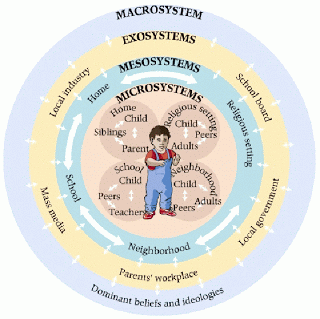Month 58
Development, it turns out, occurs through this process of progressively more complex exchange between a child and somebody else--especially somebody who's crazy about that child – Urie Bronfenbrenner

Urie Bronfenbrenner (1917-2005) developed the ecological systems theory to explain how everything in a child and the child's environment affects how a child grows and develops. He labeled different aspects or levels of the environment as microsystem, the mesosystem, the exosystem, and the macrosystem.
The microsystem is the small, immediate environment the child lives in. Children's microsystems will include any immediate relationships or organizations they interacts with, such as their immediate family or caregivers and their school or daycare. How these groups or organizations interact with the child will have an effect on how the child grows; the more encouraging and nurturing these relationships and places are, the better the child will be able to grow.
The mesosystem, describes how the different parts of a child's microsystem work together for the sake of the child. For example, if a child's caregivers take an active role in a child's school, such as going to parent-teacher conferences and watching their child's soccer games, this will help ensure the child's overall growth.
The exosystem level includes the other people and places that the child herself may not interact with often herself but that still have a large affect on her, such as parents' workplaces, extended family members, the neighborhood, etc. For example, if a child's parent gets laid off from work, that may have negative affects on the child if her parents are unable to pay rent or to buy groceries for her physical needs.
Bronfenbrenner's final level is the macrosystem, which is the largest and most remote set of people and things to a child but which still has a great influence over the child. The macrosystem includes things such as the relative freedoms permitted by the national government, cultural values, the economy, wars, etc. These things can also affect a child either positively or negatively.
How I think @58 months
Your child at this stage approaches the world with great curiosity and uses his imagination to help understand it. Hands-on explorations help him to separate reality from fantasy. He can participate in the planning and implementation of simple scientific investigations and over the course of the year, will increase his ability to make observations, gather information, compare data, identify patterns, describe and discuss observations and form explanations and generalizations.
Motor Development: Gross Motor Skills
▪ I enjoy joining in with dancing and ring games
▪ I sing a few familiar songs
▪ I am beginning to move rhythmically
▪ I can imitate movement in response to music
▪ I am eager to tap out simple repeated rhythms
Motor Development: Fine Motor Skills
▪ I can hold pencil near point between first two fingers and thumb and uses it with good control
▪ I know how to operate simple equipment, e.g. turn on CD player and use remote control
▪ I show an interest in technological toys with knobs or pulleys, or real objects such as cameras or mobile phones
▪ I show skill in making toys work by pressing parts or lifting flaps to achieve effects such as sound, movements or new images
Language and Thinking Development
▪ I think literally; and starting to develop logical thinking
▪ I have begun to grasp that pictures and symbols can represent real objects
▪ I have started to recognize patterns among objects — round things, soft things, animals
▪ I grasp the concepts of past, present, and future but do not yet understand the duration of time
Social and Emotional Development
▪ I can select and use activities and resources with help
▪ I welcome and value praise for what I have done
▪ I enjoy responsibility of carrying out small tasks
▪ I am more outgoing towards unfamiliar people and more confident in new social situations
▪ I am confident to talk to other children when playing, and communicate freely about own home and community
Activities
Disclaimer: This presents an overview of child development. It is important to keep in mind that the time frames presented are averages and some children may achieve various developmental milestones earlier or later than the average but still be within the normal range of development. This information is presented to help parents understand, at a high level, what to expect from their child. Any questions/concerns you may have about your child’s development should be shared with your doctor.




